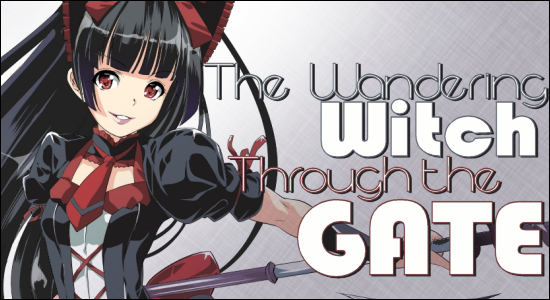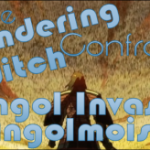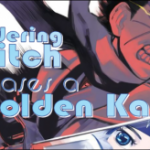The Wandering Witch – Through the GATE!

Welcome, all, again. This season has provided many stellar series, but GATE demands special recognition for its attention to detail and story development. Perhaps my own prior military service colors my admiration for this show, but it is more my interest in history that fuels my appreciation for the writers’ delicate exploration of social and political considerations exhibited by individuals and nations. This is especially noticeable in the contrast of wartime mentalities between the two main nations engaged in hostilities–subjugation through brute force versus the winning of a populace’s hearts and minds. But victory of any sort is a complicated business, and always expensive to maintain. . .
But I’ve gotten ahead of myself. Our story begins with the sudden appearance in Ginza, Tokyo, of a portal originating in another world. This is, apparently, an invasion technique used to great effect by the Empire which controls it, allowing them an instantaneous and unpredictable point of attack against their chosen victim. Unfortunately for them, however, their gate seems to have gone rogue this time and slipped dimensions, bringing them into a world of which they were entirely ignorant. Even more unfortunate for them, that new world loses its own ignorance of the Empire’s existence. Thousands of the Empire’s troops swarm Ginza and massacre civilians, but are quickly routed by Japan’s Self Defense Force. And then Japan decides to push back. Now, please allow me a sidebar here. I’ve read review after review describing GATE as some show about a modern country invading and occupying a more primitive society–complete with all the bellyaching about how immoral such behavior is. And I wonder at how quickly these reviewers forget that the story’s catalyst was that primitive society’s unprovoked attack upon and slaughter of the citizens of that modern country. I have also seen very thinly disguised references and comparisons to recent US policy. And still I wonder. As a proud prior service member, I would point out that a government’s most basic, most sacred duty is the protection of its citizenry, whether from internal oppression or foreign aggression. When you are attacked, you carry the fight to the enemy–thus removing your civilian populace from the line of fire. But enough sidebar rant.
To point: Japan has suffered an invasion which caused many civilian casualties. They defeat the enemy forces and capture the gate through which that enemy arrived. Then, not knowing that enemy’s strength or further intentions, Japan sends the Self Defense Force through the gate in order to carry the fight to their enemy. But Japan recognizes many different possibilities in the fact that they control the only known portal to this new dimension, and they would rather establish friendly relations and trade–after, of course, crippling the Empire’s military capabilities. No sense in inviting another invasion. Rather, beat them and then help them rebuild, re-working the social fabric as you go. And if this sounds sinister, well, it’s not as bad as the old way of attempting to exterminate whole cultures. After all, the point of war remains unchanged–to win. And after victory? If continued contact can lead to expanded trade and cultural exchange, then some good might yet be salvaged from the situation.
And that’s where Yoji Itami becomes so important to the story. Itami is a (reserve) member of the Self Defense Force, with a reputation as something of a slacker. He is also an otaku, and was visiting Ginza in pursuit of such interests when the invasion occurred. Itami quickly asserted himself and helped organize an impromptu evacuation and sheltering of civilians, which saved countless lives. In recognition of this, he is promoted to first lieutenant, activated, and sent as part of the SDF expedition into the Special Region (as Japan calls the newly discovered world). Itami’s otaku background makes him an unflappable front man in dealing with the residents of the Special Region, populated as it is by creatures of legend. Elves, dragons, cat-girls? No problem. Itami can take it all in stride and still focus upon the mission. And that’s good, because the mission is in constant flux. Defeating enemy armies; establishing friendly relations with the locals; rescuing and re-establishing refugees–occupation makes invasion look easy, and that’s before all the attendant political intrigue is considered. After all, other nations in our world are jealous of Japan’s singular access to new lands, wondering how they might make independent contact. Meanwhile, military defeat brings political instability to the Empire, complicating efforts to negotiate with them.
I loved Outbreak Company, and wondered then what a more serious examination of such a meeting of cultures might be like. I have my answer. GATE is entertaining while also thought-provoking, providing a sweeping perspective of military influence upon–and as a result of–social development. From Rome’s struggles to transition from republic to empire, straight through to today’s convoluted ideas of victory and occupation, GATE mirrors historical situations while visiting multiple viewpoints: civilian, military, and governmental. The effect is enlightening.



![f3efca6a6f4c5892b69b0b82f161a8c51418968331_full[1]](http://918thefan.com/wp-content/uploads/2015/09/f3efca6a6f4c5892b69b0b82f161a8c51418968331_full1-209x300.jpg)
![600px-Gate_JSDF_01_Type89_(5)[1]](http://918thefan.com/wp-content/uploads/2015/09/600px-Gate_JSDF_01_Type89_51-300x169.jpg)
![hqdefault[1]](http://918thefan.com/wp-content/uploads/2015/09/hqdefault1-300x225.jpg)













I really am enjoying this series, it has quickly became one of my favorites of the season.
Mine, too! I didn’t start this series until several weeks in, then couldn’t stop watching until I’d caught up. Just great story and character development, and meticulous attention to detail!
Yeah, I started it a few weeks later as well. I don’t know if you caught on to this but I see parallels with the Japanese occupation of the Empire and American occupation of Japan. It’s a real smart series that is doing things a lot better than Outbreak Company, which I still loved- but this series is a whole other beast completely focusing on the characters, culture class, and has more of a story going for it.
Again, I agree. The technical accomplishment of this series, to me, is the fact that it successfully juxtaposes realistic situations from various historic periods. And while we both compared it to Outbreak Company, I think that it’s only fair to point out that the two stories must be told differently–Outbreak Company’s storyline is character-driven, whereas GATE’s is action-driven. Completely different sets of mechanics and machinations involved. . .